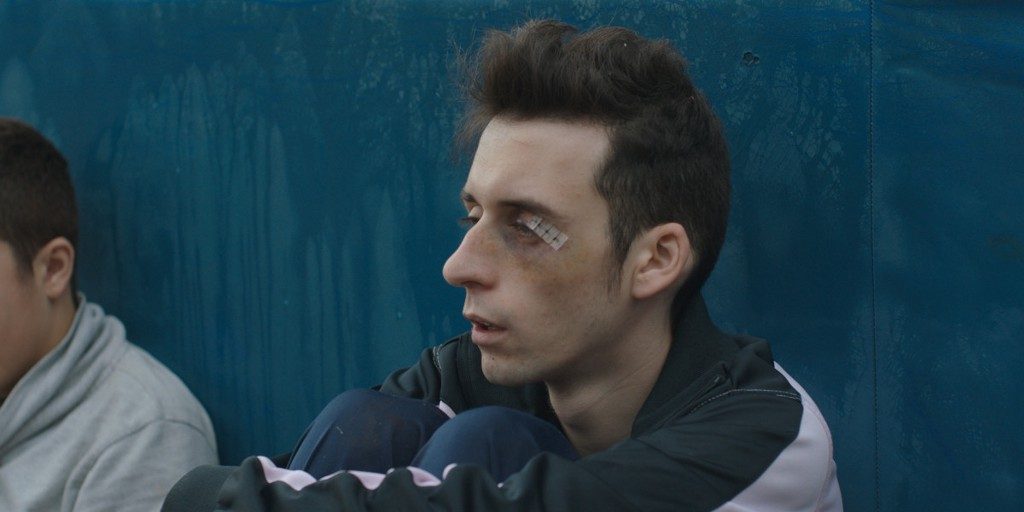Sofia Exarchou was born in Athens. She has been working as an assistant director in feature films and commercials since 2004. She has written and directed two short films, “Distance” and award–winning “Mesecina.” In 2014, she participated in the Sundance Screenwriters Lab and Directors Lab. “Park” is her first feature film.
W&H: Describe the film for us in your own words.
SE: “Park” tells the stories of a group of kids who live in the abandoned Olympic Village in Athens today, 12 years after the games. It follows their everyday life, their isolation, and the tension and violence provoked as a result of their “entrapment” in that place — their need to fill their void with paradoxical games and stimulating actions, their animalistic instincts, and their attempts to escape.
W&H: What drew you to this story?
SE: Three images: the image of a group of kids running and playing among athletic ruins; the image of a young boy with a stray dog above the dirty water of an abandoned swimming pool; and the image of a girl with injuries, a retired athlete, who lives in this place.
The combination of these three images was the beginning of my story. I liked idea of “creating a world” starting with these materials. The place, the Olympic Village, is real but “Park” is not a documentary. It’s the combination of a real environment with all these imaginative characters and their stories.
What I also found very interesting is that the Olympic Village, for these boys, because they are very young, is the place that they have lived their whole life, a place that has defined them. Thinking about the Village and all the ideas that it represents for Greece, but also for the Western world in general, I wanted to depict the contradiction between the image of this young generation and this “haunted” place. The story of “the big show” and the collapse after the “show”.
W&H: What do you want people to think about when they are leaving the theater?
SE: I would like people to experience the feeling of living in the world of those kids. The isolation, the urge to feel alive, the absence of parents, the hunger for affirmation, and the need for acceptance and self-acceptance.
W&H: What was the biggest challenge in making the film?
SE: The biggest challenge was to find the group of boys and the girl who play the main characters of the film. We did a huge casting that lasted over six months and we auditioned over 500 kids. At the final stage of auditions, we focused on improvisational games in order to create a group of boys who would fit together and would be able to communicate and relate to each other.
The process of casting as well as the period of rehearsals was the the biggest yet the most creative challenge in making “Park.” Most of the kids are non-professional actors and very few from acting schools: Some of the most interesting moments in the film came out of these improvisations with the kids.
W&H: How did you get your film funded? Share some insights into how you got the film made.
SE: The film had a good run from treatment stage — autumn 2012 — at various European script and co-production markets, where it won multiple awards. We were then able to start the pre-production, mainly the casting. In January 2014, I was selected to attend the Sundance Screenwriting Lab followed by the Director’s lab which helped “Park’s” visibility and generated excitement for the project.
We then got local studio and production powerhouse Faliro House on board, which provided the green light for the film entering into production. And about a year later, in the final stages of editing, the Greek Film Center and Greek national television (ERT) agreed to support the completion of the film, enabling us to be where we are now.
W&H: What does it mean for you to have your film play at TIFF?
SE: The whole team of “Park” is very excited for our World Premiere at TIFF. Toronto International Film Festival is one of the biggest and most prestigious film festivals in the world and we are, therefore, very happy to present our film among this huge variety of very interesting films. I also hope that our participation at TIFF will give “Park” the opportunity to reach a wider audience.
I’m very much looking forward to watching the film with the audience in Toronto, to seeing the reactions and discussing “Park” after the screenings.
W&H: What’s the best and worst advice you’ve received?
SE: The best advice I’ve heard comes from a quote by writer Richard Woodward: “fearless naturalism — a belief that by looking patiently at what others ignore or look away from, interesting things can be seen.”
And the worst advice: “Just cover the scene: Wide shot — Close up — Close up.”
W&H: What advice do you have for other female directors?
SE: The same that I have for male directors: Dare to explore through your work the themes, the stories, and the feelings that you are mostly afraid to approach.
W&H: Name your favorite woman-directed film and why.
SE: “The Swamp” by Lucrecia Martel. Unconventional narrative, very interesting staging of actors, editing, and sound design. Hypnotizing atmosphere and one of my favorite opening scenes.
W&H: Have you seen opportunities for women filmmakers increase over the last year due to the increased attention paid to the issue? If someone asked you what you thought needed to be done to get women more opportunities to direct, what would be your answer?
SE: There is more conversation going on and filmmakers are less afraid to talk about this subject. The way I see it, the initiatives should focus on the idea of equal opportunities for male and female filmmakers. Diversity constitutes an essential aspect of making a film. We shouldn’t be afraid of it, but learn to embrace it.






